Precision Medicine, Big Data and Human Rights
Jan-Gowth Chang, MD
Department of Laboratory Medicine, Epigenome Research Center
China Medical University Hospital, China Medical University, Taiwan
ABSTRACT Precision medicine is “using the best diagnostic results to make the best treatment for the patients”. In order to achieve the goal, we need the best tools for diagnosis, drug choice, and disease monitoring. As mentioned by the US President Barack Obama, these are “tools better predict which treatment will be most effective”. The basis of the best diagnostic results and treatment is everyone’s genome, and we must consider “individual differences in people’s genome, environments and lifestyles”. Recently, the improvement of next generation sequencing technologies makes the price sharply down to near 1000 US dollars for one human genome, and shortens the sequencing time to one human genome a day. These progresses make Precision Medicine become reality. Precision Medicine not only involves everyone’s personal genomic data, but also epigenome and other omics big data and many dynamic big data. How to integrate these big data to be used and to produce real-time actionable reports for physician is a very important issue, and we need to reconstruct the present medical information system to fulfill the goal.
From personal big data, we shall easily and precisely recognize a specific person and we can use this information to do a lot of activities. This may invade the privacy of human right. How to prevent it happen is also a very important issue. We propose a specific infrastructure which may solve these problems.
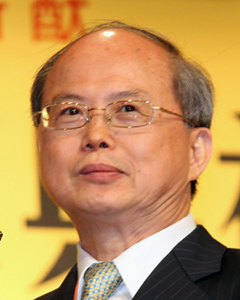 BIOSKETCH Prof. Jan-Gowth Chang is a clinical pathologist and his major is genetics and hematology. He got three times Outstanding Research Award and two times Merit MOST Research Fellow Award from Ministry of Science and Technology. He has developed several methods for molecular analysis and prenatal diagnosis of thalassemia (a very common hereditary disease in Taiwan) and spinal muscular atrophy, and his team developed a mouse model for spinal muscular atrophy and established methods and drugs for the disease. In addition, he is also interested in bioinformatics, especially in non-coding RNA, and he cooperated with Dr. Hsien-Da Huang from NCTU and Dr. Wen-Ling Chan from Asian University to develop pseudoMap and lncRNA tools for RNA related researchers. Now, he is paying much attention on the research of precision medicine, big data and privacy.
BIOSKETCH Prof. Jan-Gowth Chang is a clinical pathologist and his major is genetics and hematology. He got three times Outstanding Research Award and two times Merit MOST Research Fellow Award from Ministry of Science and Technology. He has developed several methods for molecular analysis and prenatal diagnosis of thalassemia (a very common hereditary disease in Taiwan) and spinal muscular atrophy, and his team developed a mouse model for spinal muscular atrophy and established methods and drugs for the disease. In addition, he is also interested in bioinformatics, especially in non-coding RNA, and he cooperated with Dr. Hsien-Da Huang from NCTU and Dr. Wen-Ling Chan from Asian University to develop pseudoMap and lncRNA tools for RNA related researchers. Now, he is paying much attention on the research of precision medicine, big data and privacy.
Big Data, Cyber Security, and Healthcare
Peter Pin-Shan Chen
Distinguished Career Scientist, Software Engineering Institute and CERT
Carnegie Mellon University, USA
ACM/IEEE/AAAS Fellow
ABSTRACT Big Data and Cyber Security have attracted a lot of attention in healthcare and many other fields. In recent years, the amount of data has been increasing exponentially, almost to the level of unmanageable by the conventional relational database technology. Fortunately, new techniques and tools have been developed to “make sense” of the big data. On the other hand, big data has its own inherent problems such as security and privacy. It is more difficult to protect the security and privacy of big data than before. Almost every week, there is a news story about huge data sets were stolen from companies, medical institutions, and governments. On Dec 22, 2015, U.S. President Barack Obama signed into law a $1.1 trillion spending bill including the Cybersecurity Information Sharing Act (CISA). On February 9, 2016, President Obama proposed a $19 billion National Cybersecurity Action Plan (NCAP) outlining a grand plan to significantly improve the cybersecurity. All these indicate cybersecurity is a very important problem for not only the U.S. but all other countries in the world. Therefore, a question comes to mind: is big data a big mess, or a panacea? In this talk, we will focus on several more fundamental and critical issues of big data and its impacts on healthcare and the society.
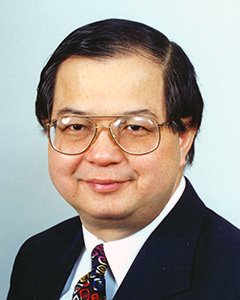 BIOSKETCH Dr. Peter Chen is Distinguished Career Scientist at Software Engineering Institute and CERT (Cyber Emergency Response Team), Carnegie Mellon University (CMU). He is internationally known for his invention of the Entity-Relationship (ER) Model, an ANSI standard and a foundation of many systems analysis and design methodologies and commercial products. His original ER model paper is ranked as one of 38 most influential papers in Computer Science. He was recognized as one of 16 pioneers in the book, Software Pioneers (Springer, 2002).
BIOSKETCH Dr. Peter Chen is Distinguished Career Scientist at Software Engineering Institute and CERT (Cyber Emergency Response Team), Carnegie Mellon University (CMU). He is internationally known for his invention of the Entity-Relationship (ER) Model, an ANSI standard and a foundation of many systems analysis and design methodologies and commercial products. His original ER model paper is ranked as one of 38 most influential papers in Computer Science. He was recognized as one of 16 pioneers in the book, Software Pioneers (Springer, 2002).
With a Harvard Ph.D., he was a professor at MIT, UCLA, and LSU and a visiting professor at Harvard/MIT/CMU, adjunct professor of bioinformatics at LSU Medical School, and honorary chair professor, National Tsing Hua University, Taiwan. Dr. Chen is active in research and professional activities in Big Data, Cyber Security, Software Engineering, and Internet/Web. He was an Invited Expert in Worldwide Web Consortium (W3C) specifying the Web standards. He was a member of the U.S. NSF/CISE Advisory Committee and the U.S. Air Force Scientific Advisory Board making cyber warfare recommendations to the Secretary of the Air Force. He has served as keynote speaker for more than 35 conferences and the Conference Co-chair for both 2015 and 2016 IEEE BigData Congresses. Dr. Chen is an ACM, IEEE, and AAAS Fellow and listed in Who’s Who in America and Who’s Who in the World. He received many awards including ACM/AAAI Allen Newell Award, IEEE Harry Goode Award, Stevens Software Innovation Award, DAMA International Award, Data Mgmt Hall of Fame, Software Eng. Society Transformative Award, and Pan Wen-Yuan Research Excellence Award. Recently, two annual awards were set up in his name by professional societies: Peter Chen (Conceptual Modeling) Award and Peter Chen BigData Young Researcher Award.
Cancer Genomes
Wen-Hsiung Li
Biodiversity Research Center, Academia Sinica, Taiwan
Department of Ecology and Evolution, University of Chicago, USA
Member, National Academy of Sciences; Fellow, American Academy of Arts and Sciences; Academician, Academia Sinica, Taiwan
ABSTRACT Tumorigenesis can be regarded as an evolutionary process, driven by mutation and selection. Cancer genomics studies have provided tremendous amounts of data for addressing how cancer cells evolve. To elucidate the underlying evolutionary process of cancer cell evolution, we have conducted three studies. (1) First, we addressed the question of “from the view point of the human protein-protein interaction network (PPI) where are cancer causal mutations more likely to occur in the PPI?” Are they much more likely to occur in hubs? Are cancer genes evolutionarily very ancient? (2) Is the DNA replication timing an important determinant of the somatic mutation rate? Is the mutation rate higher in late replication regions than in early replication regions? Are cancer driver genes more likely to locate in early replication regions? (3) Do tumor cells evolve by Darwinian (positive) selection, as commonly believed? And how much genetic diversity exists in a tumor? This question has important implications for cancer therapy. In my talk, I will present the above three studies.
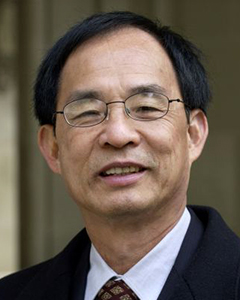 BIOSKETCH Wen-Hsiung Li’s research interests are in bioinformatics, computational biology, and molecular and genomic evolution. He is Director and Distinguished Research Fellow, Biodiversity Research Center, Academia Sinica, Taiwan and the James Watson Professor, Department of Ecology and Evolution, University of Chicago. He was elected to the National Academy of Sciences, USA in 2003 and received the Balzan Prize for Genetics and Evolution in 2003 and the Mendel Lecture and Medal in 2009. He serves as Editor, Molecular Phylogenetics and Evolution, Associate Editor, Genome Biology & Evolution, and Editorial Board, Genome Research and he served as Associate Editor, PloS Computational Biology 2005-2012. He was President, Society for Molecular Biology and Evolution, 2000.
BIOSKETCH Wen-Hsiung Li’s research interests are in bioinformatics, computational biology, and molecular and genomic evolution. He is Director and Distinguished Research Fellow, Biodiversity Research Center, Academia Sinica, Taiwan and the James Watson Professor, Department of Ecology and Evolution, University of Chicago. He was elected to the National Academy of Sciences, USA in 2003 and received the Balzan Prize for Genetics and Evolution in 2003 and the Mendel Lecture and Medal in 2009. He serves as Editor, Molecular Phylogenetics and Evolution, Associate Editor, Genome Biology & Evolution, and Editorial Board, Genome Research and he served as Associate Editor, PloS Computational Biology 2005-2012. He was President, Society for Molecular Biology and Evolution, 2000.
Understanding and Interpreting Cancer Big Data by Supercomputer and Artificial Intelligence
Satoru Miyano
Director of Human Genome Center
University of Tokyo, Japan
ISCB Fellow
ABSTRACT This lecture gives details of Genomon2 and our practices of a clinical cancer genome sequencing system with IBM Watson Genomic Analytics (WGA) at the Institute of Medical Science, The University of Tokyo (IMSUT). Genomon2 that is a suite of bioinformatics tools for analyzing cancer genomes and RNA sequencing data. It enables us to perform sensitive and accurate detection of most types of genomic variants (single nucleotide variants, short indels, mid-size indels and large scale structural variations), and transcriptomic changes (gene fusions, aberrant splicing patterns). It adopts an efficient job scheduling framework that enables us easily analyzing several hundreds of genome and transcriptome sequencing data simultaneously. Genomon2 is easy to install, and after installation, users can start analysis just preparing simple sample configuration files. The clinical cancer genome sequencing team has been using WGA at the research hospital of IMSUT since July of 2015. Genomon2 is used for genome sequence data analysis in this system for whole genome, whole exome, and panel. We show how WGA is used for clinical sequence for hematological malignancies and some solid tumors.
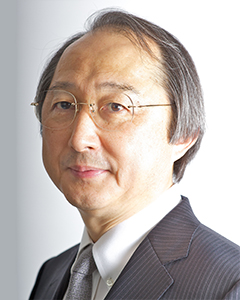 BIOSKETCH Dr. Satoru Miyano is the Director of Human Genome Center, the Institute of Medical Science, the University of Tokyo. He received the B.S. (1977), M.S. (1979) and PhD (1984), all in Mathematics from Kyushu University, Japan. He has been working in the field of Bioinformatics and joined Human Genome Center as a professor in 1996. His research mission is to develop “Computational Medical Systems Biology towards Genomic Personalized Medicine”, in particular, cancer research and clinical sequence informatics. He has been involved as PI with the International Cancer Genome Consortium and Strategic Programs for Innovative Research Field 1 by MEXT – Large-Scale Data Analysis with K computer. By massive data analysis and simulation with the supercomputers, his group is developing computational methods to link differences in our genomes to diseases, drugs, and environmental factors.
BIOSKETCH Dr. Satoru Miyano is the Director of Human Genome Center, the Institute of Medical Science, the University of Tokyo. He received the B.S. (1977), M.S. (1979) and PhD (1984), all in Mathematics from Kyushu University, Japan. He has been working in the field of Bioinformatics and joined Human Genome Center as a professor in 1996. His research mission is to develop “Computational Medical Systems Biology towards Genomic Personalized Medicine”, in particular, cancer research and clinical sequence informatics. He has been involved as PI with the International Cancer Genome Consortium and Strategic Programs for Innovative Research Field 1 by MEXT – Large-Scale Data Analysis with K computer. By massive data analysis and simulation with the supercomputers, his group is developing computational methods to link differences in our genomes to diseases, drugs, and environmental factors.
Dr. Miyano is a Co-Founder of GNI Ltd. in 2001. Dr. Miyano served as Member of Scientific Advisory Board of GNI Ltd. Dr. Miyano has been recognized internationally for his achievements in his field and received the IBM Science Award and the Sakai Award of the Information Processing Society of Japan for his achievements in Information Science. Since 2015, he started to serve as the president of Kanagawa Cancer Center to promote cancer genomic medicine. He is an ISCB Fellow (The International Society for Computational Biology).
Improving Consistency and Coverage of MS-based Proteomics
Limsoon Wong
KITHCT chair professor
National University of Singapore, Singapore
ACM Fellow
ABSTRACT Mass spectrometry (MS)-based proteomics is a widely used and powerful tool for profiling systems-wide protein expression changes. It can be applied for various purposes, e.g. biomarker discovery in diseases and study of drug responses. Nonetheless, MS-based proteomics tend to have consistency issues (poor reproducibility and inter-sample agreement) and coverage issues (inability to detect the entire proteome) that need to be urgently addressed. This talk discusses how these issues can be addressed by proteomic profile analysis techniques that use biological networks (especially protein complexes) as the biological context. In particular, several techniques that we have been developing for complex-based analysis of proteomics profile are described. These techniques are useful in identifying proteomics-profile analysis results that are more consistent, more reproducible, more robust in the presence of batch effects, and more biologically coherent, and these techniques allow expansion of the detected proteome to uncover and/or discover novel proteins. Incidentally, I think this work beautifully demonstrates the triumph of logic and computational thinking over noise. (Joint work with Wilson Wen Bin Goh.)
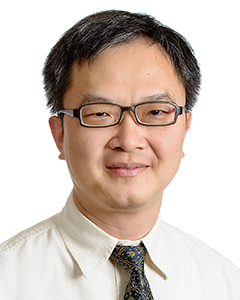 BIOSKETCH Limsoon Wong is KITHCT Chair Professor of Computer Science and Professor of Pathology at the National University of Singapore. He currently works mostly on knowledge discovery technologies and their application to biomedicine. He is a Fellow of the ACM, inducted for his contributions to database theory and computational biology. He co-founded Molecular Connections, an information extraction and curation services company in India, and oversaw its steady growth over the past decade to nearly 2000 research engineers, scientists, and curators.
BIOSKETCH Limsoon Wong is KITHCT Chair Professor of Computer Science and Professor of Pathology at the National University of Singapore. He currently works mostly on knowledge discovery technologies and their application to biomedicine. He is a Fellow of the ACM, inducted for his contributions to database theory and computational biology. He co-founded Molecular Connections, an information extraction and curation services company in India, and oversaw its steady growth over the past decade to nearly 2000 research engineers, scientists, and curators.
On Mining Brain Networks
Philip S. Yu
UIC Distinguished Professor and Wexler Chair in Information Technology
University of Illinois at Chicago, USA
ACM/IEEE Fellow
ABSTRACT In this talk, we examine some recent advances in mining brain network data to detect neurological disorder. Modern imaging techniques have allowed us to model the human brain as a network or graph. A brain connectivity network can be constructed from neuroimaging data, where the nodes of the network correspond to a set of brain regions and links represent the functional or structural connectivity between these regions. The linkage structure in brain networks can encode valuable information about the organizational properties of the human brain as a whole. As the functional connectivity among different brain regions is highly uncertain, each human brain needs to be represented as an uncertain graph, where the edges represent the probabilistic connections, e.g., resting-state functional connectivity in fMRI (functional Magnetic Resonance Imaging). Resting-state functional connectivity has shown alterations related to many neurological diseases, such as Bipolar, ADHD (Attention Deficit Hyperactivity Disorder), Alzheimer’s disease and virus infections that may affect the brain functioning such as HIV. We examine the challenges and advances in analyzing or mining the complex structure and uncertain connectivity of human brains to find biomarkers for neurological diseases. Such biomarkers are highly desirable to aid in the diagnosis, monitor disease progression and to evaluate treatment effect of new drugs and therapies. As measurements from a series of medical examinations are often available for each patient, including clinical, imaging, immunologic, serologic and cognitive measures, we further study how to combine all these features together in an effective way for disease diagnosis by exploring advances in multi-source learning.
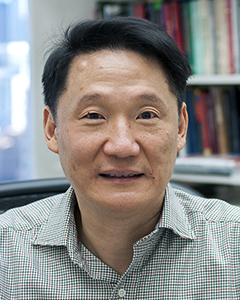 BIOSKETCH Dr. Philip S. Yu is a Distinguished Professor and the Wexler Chair in Information Technology at the Department of Computer Science, University of Illinois at Chicago. Before joining UIC, he was at the IBM Watson Research Center, where he built a world-renowned data mining and database department. He is a Fellow of the ACM and IEEE. Dr. Yu is the recipient of ACM SIGKDD 2016 Innovation Award for his influential research and scientific contributions on mining, fusion and anonymization of big data, the IEEE Computer Society’s 2013 Technical Achievement Award for “pioneering and fundamentally innovative contributions to the scalable indexing, querying, searching, mining and anonymization of big data”, and the Research Contributions Award from IEEE Intl. Conference on Data Mining (ICDM) in 2003 for his pioneering contributions to the field of data mining. Dr. Yu has published more than 970 referred conference and journals papers cited more than 74,000 times with an H-index of 127. He has applied for more than 300 patents.
BIOSKETCH Dr. Philip S. Yu is a Distinguished Professor and the Wexler Chair in Information Technology at the Department of Computer Science, University of Illinois at Chicago. Before joining UIC, he was at the IBM Watson Research Center, where he built a world-renowned data mining and database department. He is a Fellow of the ACM and IEEE. Dr. Yu is the recipient of ACM SIGKDD 2016 Innovation Award for his influential research and scientific contributions on mining, fusion and anonymization of big data, the IEEE Computer Society’s 2013 Technical Achievement Award for “pioneering and fundamentally innovative contributions to the scalable indexing, querying, searching, mining and anonymization of big data”, and the Research Contributions Award from IEEE Intl. Conference on Data Mining (ICDM) in 2003 for his pioneering contributions to the field of data mining. Dr. Yu has published more than 970 referred conference and journals papers cited more than 74,000 times with an H-index of 127. He has applied for more than 300 patents.
Dr. Yu is the Editor-in-Chief of ACM Transactions on Knowledge Discovery from Data. He is on the steering committee of ACM Conference on Information and Knowledge Management and was a steering committee member of the IEEE Data Engineering and the IEEE Data Mining Conference. He was the Editor-in-Chief of IEEE Transactions on Knowledge and Data Engineering (2001-2004). He received the ICDM 2013 10-year Highest-Impact Paper Award, and the EDBT Test of Time Award (2014). He had also received several IBM honors including 2 IBM Outstanding Innovation Awards, an Outstanding Technical Achievement Award, 2 Research Division Awards and the 94th plateau of Invention Achievement Awards. He was an IBM Master Inventor. Dr. Yu received his PhD from Stanford University and BS from National Taiwan University.


